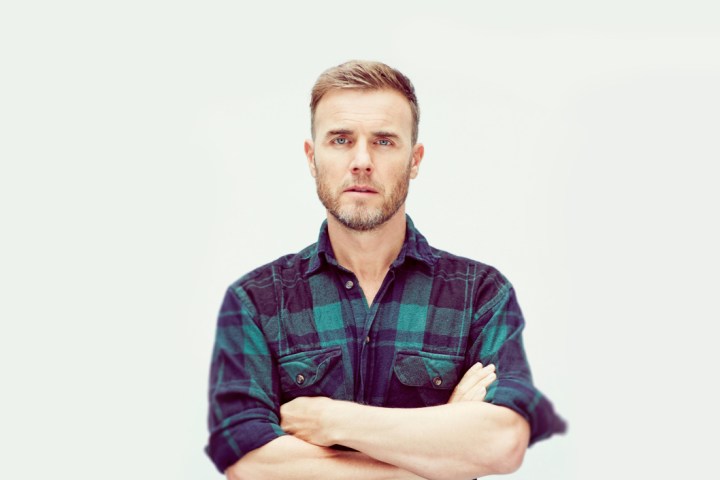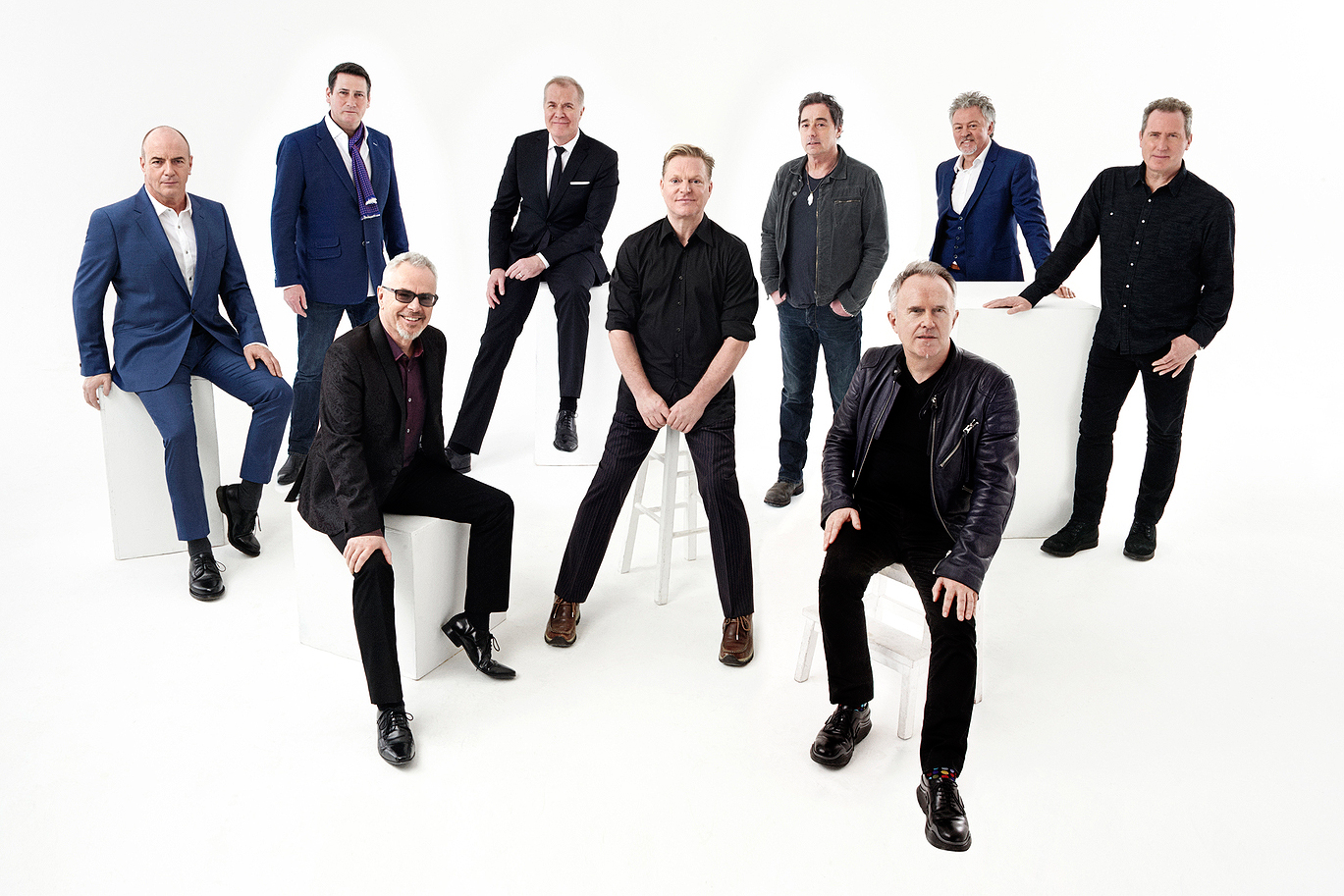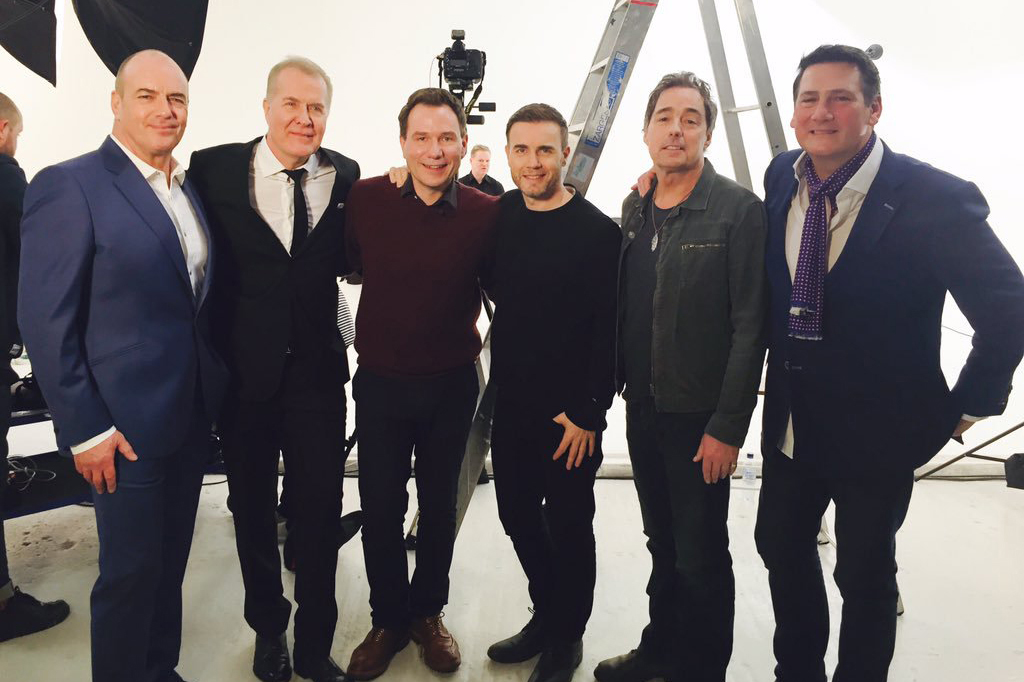
“I don’t care, really, how people discover music — I just want them to discover it.”
People are often warned about what might happen if they meet their heroes. One slight misstep, and the myth and legend of what they’ve meant to you over your lifetime could be shattered forever. But that scenario never once crossed the mind of international recording star Gary Barlow, who jumped at the chance to write and produce songs for a number of his ’80s recording idols for FLY – Songs Inspired by the Film Eddie the Eagle (now available in various formats from Universal UMC).
Barlow — one of Britain’s most successful songwriters ever, having penned 14 Number 1 singles and 24 Top 10 hits to date, not to mention selling over 50 million records worldwide both as a solo artist and a member of Take That — had been called upon by producer Matthew Vaughn (Kick Ass, X-Men: Days of Future Past) to discuss the music that would be used in the film Eddie the Eagle. Eagle, the inspiring true story of an underdog British ski-jumper who competed at the 1988 Calgary Winter Olympics, stars Hugh Jackman and Taron Egerton, and following an early-2016 theatrical run, was just released on Blu-ray, DVD, and digital HD formats this Tuesday.
“Matthew asked me, ‘Should we just sign up loads of old ’80s tracks from everyone we know and love for this?’” Barlow told Digital Trends. “Of course, that would have been the easiest way of putting music to this film. But deep inside of me, the older artists we had been talking about — they were my heroes. They were the people I listened to. In a lot of ways, they are the people I should be thanking for being here right now, because their music helped me creatively. They helped me learn, and helped me want to do the job I’m doing.”

Rather than license and recycle a number of well-known of-era tracks, the songwriter instead suggested a bucket list of ’80s artists he’d like to shepherd to work on all-new material written specifically for the film. And, with that, a unique vintage-yet-modern soundtrack compilation was born. “It felt right when the idea came off so successfully,” Barlow admitted. “I do recall saying, ‘Well, listen — it probably makes no economical sense to anybody anywhere in the world, but I think we’ve got to do this.’”
Barlow’s instincts clearly paid off, for the 14 songs that comprise FLY are the perfect cross-pollination of 2016 sensibilities with 1980s verve and panache, from Howard Jones’ soaring Eagle Will Fly Again to Nik Kershaw’s uplifting sing-along The Sky’s the Limit to Go West’s synth-tastical Determination to Heaven 17’s futuristic cloud-kissing Pray.
Paul Young, who sang FLY’s ultra-catchy People Like You (co-written by Barlow and Eliot Kennedy), told Digital Trends, “I’ve always thought Gary was a great songwriter. My oldest daughter only heard this song two or three times, and then she could sing the chorus back to me. It was that instant.”
(SoundBard aside: A related FLY story featuring interviews with Young, Jones, Kershaw, Martin Ware of Heaven 17, Richard Drummie of Go West, and Andy McCluskey of OMD will appear on DT later this month.)
Barlow called Digital Trends to discuss the seeds of this passion project, his sonic inspirations from the ’80s, and his view on streaming (which might not be what you’d expect).
Digital Trends: If I didn’t know any better, I’d swear much of what I heard on FLY actually came out in the 1980s. The OMD track, Thrill Me, fits that bill perfectly — it could have come out in 1983, even though it has hints of 2016.
Gary Barlow: Yep, yeah. The one thing that happened when I talked to everybody who’s been involved in this record is, we all got very romantic talking about getting the old hardware synth sounds. I feel like it was not only something they had forgotten about, but I had forgotten about it too. It’s all become a bit too easy the last few years, with computers being at the heart of our studios. I think they were excited to revisit those old skills that seemed forgotten. It’s been a bit of a musical vacation, I think.
Yeah, and in a good way. A number of current electronic artists have told me they’ve been trying to figure out how to get those vintage early ’80s sounds themselves. Do you hear that degree of sonic callback in modern music at all?
Absolutely! And it’s especially true of the ’90s too. A big chunk of my career was in the ’90s, and because I was a single guy in the ’90s, it was all about the music. I lived and breathed it. I have this fantastic “distraction” of a family now, but I hear the sounds and techniques, and even some of the songwriting formations, as being very ’90s at the moment. It’s really gotten back to that great time when I was starting to really make music.
Are there songs or sounds from the ’80s era that you can cite as your personal inspirations as a songwriter?
“How the hell did somebody make those incredible sounds? It was a musical feast going on in my ears.”
I always loved [producer] Trevor Horn — every record he ever made with any artist. I actually shared a studio with him about 5 years ago. I used to bump into him a lot there. But he’s a pioneer. Trevor is a pioneer of music.
His work on Frankie Goes to Hollywood’s Relax (1983) was enormous — not only the music, but it made me to really want to be on Top of the Pops making music myself. It was so fantastic, and so powerful. To draw the line between the two, I think the way Take That took those big, dramatic, and powerful songs, as well as the theatrical side, all came from listening to those enormous ’80s pop productions. [Relax hit #1 in the UK in January 1984 and sold over 2 million copies. It reached #10 in the U.S. in March 1985.]
That makes a lot of sense to me. I can see the vibe of Welcome to the Pleasuredome [Frankie Goes to Hollywood’s 1984 debut album, where Relax also appeared] in some of the songwriting style you’ve carried through with all of these years. I can also hear it in some of the co-writes and overall production values you employed on this record.
It’s always hard to talk about your own style, I think. But for me, the inspiration for being here today comes from a lot of these artists who are on this record. When I traveled around to meet them all, either to collaborate or help them find what they wanted to do for this record, it was just so rewarding. Who gets a chance to do that with their heroes? It was absolutely brilliant.
What other songs from that era are personal touchstones for you?
You know what? The very old OMD stuff — the original Enola Gay (1980), Souvenir (1981) — that was the real lightbulb going off.
I’ll bet Electricity (1979) was also a key OMD track for you. [Electricity is generally acknowledged as being the pioneering inspirational synth-pop track for many early electronic artists like Vince Clarke of Depeche Mode, Yaz, and Simple Minds.]
Absolutely, absolutely! Pretty much anything from ’79 is when the musical lightbulb went off for me — when I just started realizing, “That’s what I want to be.” Those sounds were what I dreamed of making.
I’ve spoken with Vince Clarke and Gary Numan about the music they created in that era — it’s really the blueprint for modern electronic music in a lot of ways.
It is. I remember the first time I listened to it — there was a magic in it. How the hell did somebody make those incredible sounds? It was a musical feast going on in my ears.
But ever since then, I’ve never really been shocked again by music. It was that period that I was just in heaven with these sounds. So it’s been nice living this record and feeling some of those feelings again.
I think that’s a healthy attitude. I hope this record helps people who may not know who Nik Kershaw or Go West is go find out how good they all sounded back in the day as well.
“People just think albums are collections of singles — they’re really not.”
Well, you know what? I hope that happens for all of them. I have to say, for what could have been an absolute nightmare of a record to make, it was one of the most magical experiences of my life. I found everybody super-supportive, super-involved, and wanting to put their best foot forward and deliver for the project. It was a great attitude to have.
Were you the one who decided the order of how the tracks were to be presented on this album?
If you like the sequencing, it was my idea. If you don’t like it, then it was someone else’s. (both laugh)
Then it was definitely yours, because I do like it. Would you agree sequencing is a lost art these days?
Yeah, sequencing is. It’s one of the most important parts of a record, really. It’s almost like having a book with 50 chapters, and following the chapters exactly. That sometimes makes the difference for me.
It’s the art of making an album. Somewhere along the route, people have lost a lot of that art now. People just think albums are collections of singles — they’re really not. I think they’re underestimating the audience by thinking like that.
Especially my songs — when they put their earphones on or put it on their sound system, they want to be a part of what I’ve lived for the past year or two years. You put so much time and effort and blood and sweat into these records. Of course it’s a journey — the whole thing is a personal story!
Is there one particular album that you would consider to be the most perfectly sequenced?
Yeah, there is, actually, and it’s funny — I had it on about a month ago. It was that first Seal record [1991’s Seal, which was produced by the aforementioned Trevor Horn, and features the hits Crazy and Killer]. To me, every single song on that album is absolutely beautifully produced, and the sequencing is incredible.
Do you still listen to vinyl yourself? Is that something that’s still important to you?
I don’t, you know. I didn’t really ever have a big vinyl collection — I had a cassette collection. I used to make my own Juke Box Juries on those cassettes. [Juke Box Jury was a British music-panel show.]
So I kind of missed growing up with records, but I still own most of my mom and dad’s record collection. It’s a funny one — there’s a romantic side to vinyl, and I get it completely. But I don’t know that I’m as hardcore as some of the music listeners who will only listen to vinyl. I think they’re beautiful things to own, and like I said, it’s romantic, and they take you back in your life.
How do you feel about people accessing FLY songs by streaming them?
Do you know what? I’m a bit of a strange artist, I think. I don’t care, really, how people discover music — I just want them to discover it. I want them to enjoy it and be moved by it, and buy more music, or stream more music. As long as artists are being heard and appreciated, then whatever form people choose to do that in — I don’t really care! I really don’t. I just want music to survive throughout it all.




